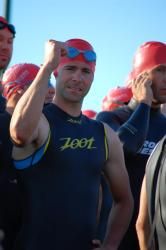The season is half over and many of us have had some success and failure as related to our season goals. Fortunately we have the ability to grow from every experience no matter how good or bad. The key to growth, both as an athlete and a person, is to continue refining performance by repeating the things that work and adjusting or changing the things that keep us from performing at our best.
I had an interesting first goal of the year at the Olympic-distance Pleasant Prairie Triathlon June 24th. I was really struggling with the swim portion of the triathlon before the event and decided to swim the course the week before. I had my fears confirmed when I flailed and panicked for the entire workout. I found out a bit too late that I needed more swim work and it showed on race day with a very slow swim time. But I did not let my poor swim affect my bike or run leg and had two great events following the swim. After the race I reflected with my peers, as well as on my own, on what I did well in the event and what things I need to do better on my next performance. I also revisited my training, especially my swim prep for the event. Upon reflection of my training process I discovered that I just was not consistent enough in the water. Some things we are naturally good at and other things need more work. Swimming is something I need to put more time into. And not just a "once and a while thing", but a consistent approach--like I tell all the athletes I work with. I did not do that this spring/summer and paid the price with a slow swim. It will be something I change in the prep for my next triathlon...whenever it might be.
Another thing I took away from the event was that my effort on the bike does not affect my run split much. Three weeks before the event I did a steady 40k effort (90% of my maximal power over that distance) and ran 10k afterward all out. My 10k time was 44.30 after my conservative bike. At the event I decided to try to go pretty much all out on the bike and survive the run, calculating the total time delta from both pacing strategies. I am currently doing some research on a theory I have about the importance of going all out on the bike (if you are a fit triathlete) and surviving the run for sprint, Olympic and, in some cases, half-IM races. I believe this will provide a faster time overall than with saving energy for the run by biking easier.
So I decided to start by testing the theory on myself instead of just collecting research from other triathletes. My theory was confirmed when I had a faster average speed on the bike with no effect on my run split! In fact my run split was a little faster than it had been three weeks before. Now, you can't draw too many conclusions here because there are many factors that could account for these results, but the important thing is that I am experimenting and trying to learn how my body responds and reacts to different stresses.
The learning process is the key to competitions and goal events. All events are valuable if you learn from them. To really learn from an event you need to create a race plan, execute it the best you can, then download afterward, not only to yourself but also to a coach or friend. That is why hanging out with your teammates after the race and discussing your race is a key element to the value of any event. The funny stories, the knowledge that gets passed and the camaraderie amongst you and your teammates anchor the event in your mind and allow you to enjoy, learn and crystallize the good, bad and crazy that happened that day.
The big challenge of this year still awaits me at the US Pro Cycling Challenge that we are doing with Trek Travel in late August. This will take fit legs and tremendous support from the VQ/TREK team from both the physical and emotional levels. We will count on everyone around us to make sure we stay focused and prepared for the many mountains, distances, altitudes and winds that will surely test our mental and physical limits. We will need TREK to have perfect support, our massage therapists to have us recovering each night, our nutrition to be dialed in both on and off the bikes and our teammates working together and helping when any of us are having a bad patch. These bad patches will happen to everyone, but with that team support we always get through them!
I am excited to share the suffering with my teammates and crew and I promise there will be lots of learning and stories shared every night. I will share some of them with you in our next newsletter.
Ciao~
Robbie

